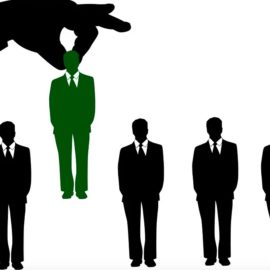

This article is an excerpt from the Shortform book guide to "The Four" by Scott Galloway. Shortform has the world's best summaries and analyses of books you should be reading.
Like this article? Sign up for a free trial here.
What does it take to become a tech giant? Who will be the next trillion-dollar tech company? Is it finally Microsoft’s turn?
The Four (Amazon, Apple, Facebook, and Google) have dominated the marketplace for years, but, even in the absence of efforts to break them up, Scott Galloway says the Four won’t always be on top. History demonstrates that even the most successful companies can’t stay on top forever.
We’ll first explore the factors Galloway claims are necessary for a business to be the next big tech company. Then, we’ll identify four potential candidates for that position. Take a look.
Factors Necessary to Be the Next Tech Giant
Galloway identifies eight factors that define the Four and are likely to be present in the next big tech company:
1) A unique product: The next tech giant must have a unique product. One way to make a product unique, notes Galloway, is to consider where technology can add value to the process of making, selling, and using the product. For example, Amazon products themselves may not be any different than other sellers’ products, but Amazon can get them to customers faster than anyone else. Another way to differentiate a product is by looking for ways to remove obstacles that make purchasing the product a pain, such as driving to the store and looking for parking.
2) The ability to attract cheap capital: The next trillion-dollar company must also have the ability to attract cheap capital by articulating a bold, easy-to-understand vision. Galloway says the Four succeeded in large part by doing exactly that, as discussed in Part 1.
3) Going global: Besides the obvious fact that a worldwide presence means a bigger market, global reach also allows a company to survive economic downturns in any one country.
4) Likability: Successful companies must be perceived to be good citizens by the government, the media, and watchdog groups. A good image can stave off regulatory intervention, as it managed to do for the Four in their early years.
5) Vertical integration: The Four each control various stages in their production and distribution process, which allows them to manage the customer experience. For example, in addition to manufacturing its products, Apple controls its distribution through its network of high-end retail stores. Similarly, any emerging tech giant must combine aspects of manufacturing or distribution to control the customer experience.
6) Artificial intelligence (AI): The Four all have technology that can learn from human input and use algorithms to control data. This is a must to make it in our rapidly changing economy. AI allows companies to monitor every aspect of our online behavior and target their marketing accordingly.
7) Career boost: The next tech giant must be perceived as offering a major career boost. Competition to get a job at the Four is fierce, and if you do so, you can climb the corporate ladder quickly.
8) Near a university: Any company that strives to dominate the market must be located near and have a symbiotic relationship with a top university, just as each of the Four draws talent from their respective neighbors Stanford, UC Berkeley, and the University of Washington.
| Identifying the Next Tech Giant Experts disagree on the characteristics necessary to become the next tech giant. Maëlle Gavet, one of Time magazine’s top 25 female “techpreneurs” and the author of Trampled by Unicorns: Big Tech’s Empathy Problem and How to Fix It, argues that two of the factors identified by Galloway—cheap capital and likability as a way to avoid regulation—are no longer determinative in a changing marketplace. Gavet says that governments and the public have become increasingly distrustful of Big Tech. They won’t tolerate the old model of reliance on cheap capital to drive rapid growth and facilitate predatory practices, such as keeping prices artificially low to undercut competitors. Instead, newer tech companies will need to grow more slowly and sustainably and realize fewer profits in order to be successful. Gavet also claims that while likability itself remains important, the next Big Tech companies will need to emphasize social responsibility and empathy not as a way to avoid regulation, but partly to demonstrate their willingness to comply with ever-expanding regulation. In addition, she says the successful tech companies of the future will care more about the rights of gig workers, and abandon the targeted advertising model that has led to so many scandals and privacy violations. Other top tech executives agree with Gavet’s focus on empathy, noting that to be successful, tech companies must put themselves in their customers’ shoes and work to make their lives easier. In addition, while more and more large tech companies are vertically integrating their businesses—often by using their vast reserves of capital to acquire smaller companies—some experts say that vertical integration in and of itself isn’t necessary for success. Whether vertical integration will help a company become the next tech giant depends on factors such as the state of the industry and whether it makes more sense for a company to own aspects of the manufacturing or distribution process or outsource them to another company that can do a better job. Since Big Tech can’t exist without data, most commentators agree with Galloway that the next giant will need to be adept at using AI to collect, monetize, and apply data to their business. They also agree that global expansion is a requirement for becoming the next tech giant. With respect to geography, studies show that the top tech companies hire from universities all across the country, not just from those located near the companies’ headquarters. For example, while Google (located in Mountain View, California) hires from many California colleges, both Columbia University (New York) and MIT (Massachusetts) are among its top five “feeder” schools. This suggests that if a company is big enough, it need not rely on nearby universities for talent—it can truly “go global” and attract top talent regardless of geography. Similarly, most Big Tech companies are perceived as providing a career boost as a byproduct of these companies’ success, not as a prerequisite for them being successful. |
Potential Candidates to Be the Next Tech Giant
In light of the factors he identifies, Galloway examines various contenders to be the next tech giant. We’ll explore four of these companies here. Ultimately, Galloway doesn’t pick a “winner,” and he notes that the next tech giant could also be a complete unknown.
Candidate #1: Alibaba
Alibaba is a Chinese company that was the world’s largest retailer in 2016. It has half a billion active users. However, Alibaba has some drawbacks. In order to be a contender, says Galloway, it has to move beyond China and go global. It also lacks a visionary CEO or a simple story. Another major drawback is its enmeshment with the Chinese government, which has supported the company by, among other things, limiting the operations of Alibaba’s competitors in China. Western investors are reluctant to back a company that engages in such unfair practices.
(Shortform note: Since The Four was published, the Chinese government’s relationship with Alibaba has shifted. The government has attempted to limit the power of the company by imposing fines and regulations. Experts say this is the result of two factors: 1) Alibaba’s founder, Jack Ma, was openly critical of the Chinese government, and 2) the initial public offering (IPO) of Alibaba’s affiliate, Ant Financial Group, would have benefited a group of powerful investors and signaled that Alibaba can take actions that contradict government policy objectives. Nonetheless, as of 2022, Alibaba ranks as #11 among the world’s largest tech companies by market cap.)
Candidate #2: Tesla
Galloway credits Tesla with controlling the customer experience in a whole new way, from their owned dealerships to their regular software updates to their network of chargers. Tesla is also able to collect data on customers through the cars themselves. Another strength is its ability to combine luxury and environmental conscientiousness. A mark of its success as a luxury brand is the fact that in 2017 Tesla only sold 80,000 cars versus Ford’s 6.7 million, but Tesla surpassed Ford in market value. However, Tesla’s weaknesses are that it’s not global, and it doesn’t have a lot of customers compared to other car companies.
(Shortform note: Tesla has grown rapidly since The Four was published, and it is now a global company: As of 2022, it had six manufacturing facilities in three countries (the US, China, and Germany) and hundreds of stores and superchargers in approximately 40 countries. In 2022, it delivered approximately 936,000 vehicles. While the number of Tesla’s customers continues to pale in comparison to other car manufacturers, Tesla was nonetheless ranked the most valuable automotive brand as of 2022 and one of the top 15 brands across all industries in 2021.)
Candidate #3: Airbnb
Like ride-sharing company Uber, vacation rental company Airbnb relies on third parties to provide its “inventory”—in Airbnb’s case, homes and apartments for short-term rental. Both operate globally and enjoy access to cheap capital. But Galloway says Airbnb’s biggest weakness is its lack of vertical integration: It doesn’t own the housing, so it can’t control the customer experience.
(Shortform note: Another major weakness of Airbnb that Galloway doesn’t mention relates to its likability. Airbnb has long been criticized for driving up the price of rent and reducing the housing inventory in the neighborhoods where it operates. Studies confirm the accuracy of these claims. Because Airbnb rentals command such high prices, many property owners rent out housing to tourists full-time and live elsewhere, rather than renting their primary residence part-time. Consequently, locals have fewer rental options at higher prices, and may opt to leave the area entirely, resulting in neighborhoods with few local residents.)
Candidate #4: Microsoft
While Microsoft isn’t the powerhouse it once was, Galloway says that could change. The vast majority (89%) of desktop computers use Windows—although Galloway notes that mobile has surpassed desktop as the preferred method of computing. One strength of Microsoft is the acquisition of LinkedIn, which, unlike other social media companies, has three sources of ad revenue: regular advertising, recruiter fees for upgraded access to job candidates, and premium subscriptions for job hunters.
(Shortform note: Galloway’s prediction that Microsoft could be the next tech giant is his most accurate. While rankings fluctuate, most consistently place Microsoft in the top four global tech companies (usually at number two) as of 2022, with a market cap of approximately $1.68 trillion. LinkedIn’s revenues have increased rapidly since Microsoft acquired it. In 2021, it had revenues of $11.5 billion—an increase of 43.7% over the prior year. LinkedIn currently has 822 billion members.)

———End of Preview———
Like what you just read? Read the rest of the world's best book summary and analysis of Scott Galloway's "The Four" at Shortform.
Here's what you'll find in our full The Four summary:
- A hard look at the success of Amazon, Apple, Facebook, and Google
- How The Four have had a profound and negative impact on our society
- How to make it in the cutthroat economy created by The Four






